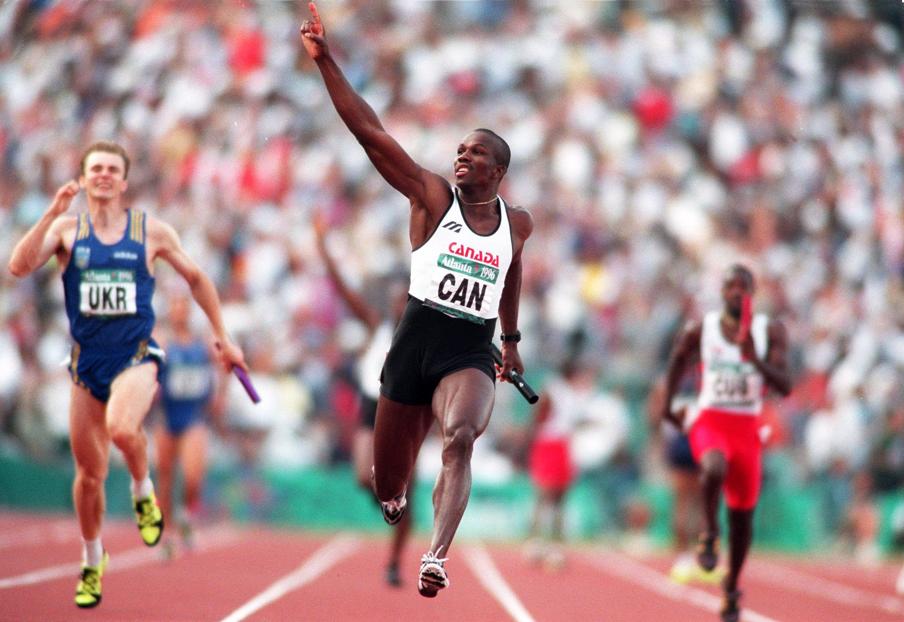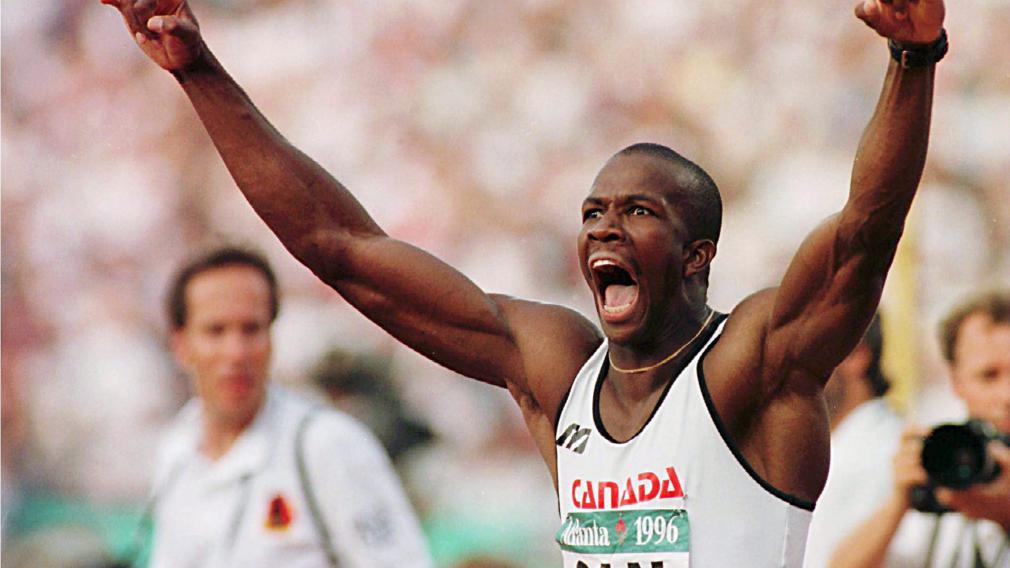
The current blizzard of retrospective doping bans being meted out by the International Olympic Committee (IOC) is making the process of clarifying who ends up with what at recent Games resemble studying the Premier League table on a Saturday evening – or of course a Sunday, Monday, or any other evening and what a shame for the TV marketing men that there are only seven of them in each week…
Talking of marketing men, the ongoing debate on doping in sport prompted another trenchant contribution at the SPORTELMonaco event on Wednesday from a Canadian who, at the age of 26, gave up a lucrative career as a marketing and property consultant in order to develop his talent as a sprinter.
Donovan Bailey – for it was he – won the world 100 metres title just over a year later in Gothenburg and then took the Olympic title at the 1996 Atlanta Games in a world record of 9.84sec. Which represented a sound investment.
Bailey was a great sprinter. But better than that, Bailey was a great sprinter who provided – and continues to provide – great copy.
In Gothenburg he broke through by taking the world title off Britain’s then Olympic champion, Linford Christie, who subsided to the track after the finish line clutching a hamstring. After Christie had recovered sufficiently to make his way out of the stadium in the direction of the team hotel, I padded hopefully after his party in a hopeful but ultimately unfruitful attempt to secure a medical bulletin.
A year later, at a press conference in London ahead of the Atlanta Olympics, Bailey mischievously contended that the only injury Christie had incurred while in Sweden was to his pride.
Bailey has a dazzling smile; he inveigles you into his way of thinking. You know this former money man is shooting a line. He knows you know. And you know he knows you know…
A year after he had beaten favorites Frankie Fredericks and Ato Boldon to 100m gold in Atlanta – in a race from which Christie was disqualified for two false starts – Bailey was set up to race over 150m on the home ground of the Toronto SkyDome against the American who had taken the 200m and 400m titles in Atlanta, Michael Johnson.
A crowd of 25,000 turned up to the Challenge of Champions to see the world’s fastest man; they had to settle for the world’s fastest buck as Bailey claimed the $1 million prize after Johnson had faltered at the halfway point because of what he later said was a problem with his left thigh.

As we huddled round the newly rich runner to get a comment it became swiftly clear that, although we had not witnessed a complete competition, we were not to be short-changed when it came to a story line.
The event was hyped to the heavens, for sure. The following day’s Toronto Sun election day issue carried the front-page headline: “Bailey for Prime Minister.” But the antipathy between the two competitors was genuine enough and Bailey, who had bridled at Johnson’s appropriating the term “world’s fastest man” for himself when that distinction traditionally lay with the Olympic 100m champion, flatly announced that he felt his opponent was “a faker and a chicken.”
Scribble scribble!!
Offered the chance a little later in the evening to amend or retract his comments, Bailey considered for a moment before that gleam returned to his eye.
“He’s called me a lot of things so, no, I don’t regret saying it,” he said.
“He knew he was going to get hammered after the first 30 meters. It was very obvious that if I was level with him at that point the gap was only going to get bigger and my butt was just going to get smaller and smaller as I pulled away from him.
“I’ve always said that this race wasn’t going to prove who was the fastest man in the world. What it was going to do was to shut Michael Johnson up.”
Fly, my typing fingers, fly!!
Fast forward all the way to this week’s SPORTELMonaco event in Monte Carlo, where my colleague Liam Morgan sought an opinion from the now 48-year-old Bailey – present in his capacity as President of the Golden Podium awards jury – on the latest retroactive Olympic re-shuffle following the disqualification of another nine competitors, including six medalists, after re-tests of samples from the 2008 Beijing Games.
Three of the nine were track and field athletes – Russia’s bronze medalist in the women’s 3,000m steeplechase, 2007 world champion Ekaterina Volkova, Spain’s 100m hurdler Josephine Onyia and Cuban long jumper Wilfredo Martinez.
Bailey lamented the fact that doping issues so often overshadow achievements in the realm of athletics, and added: “I think the IAAF [International Association of Athletics Federations] has to do something to ensure doping is not the first thing you speak of.
“I think for one you should press reset and get rid of all the records which were on the books if there has been a doping issue.
“If there is a doping charge, you erase it – it becomes very simple – so that we can talk about amazing positive things because there is so much to talk about, like Wayde van Niekerk and Usain Bolt.”
There is no mistaking the passion. But attractive as the idea of a cleansing re-boot of the records is, the devil – and the doubt – is in the detail.
Is Bailey referring, for instance, to the numerous world records still standing that were set by athletes produced by an East German regime that was belatedly revealed as being posited on a state-sponsored doping regime?
Is he referring to records which have been questioned in the light of circumstantial evidence, such as the women’s 100m record of 10.49sec set in 1988 by the late US sprinter Florence Griffith-Joyner?
One of the main problems here is that, even setting aside the eight-year statute of limitations for imposing doping bans, history is working against such judgments; the possibility of proof moves out of reach.
Bailey also supported unequivocally the decision of the IAAF to suspend Russia from international competition in the wake of the World Anti-Doping Agency (WADA) Independent Commission report in November which uncovered a state-sponsored doping scheme.
“I absolutely agree with Seb [IAAF President Coe],” the Canadian added.
“My stance would be any country that has been accused of and found guilty of state-wide doping, all the athletes should be banned.
“It is a terrible thing to do because most athletes are clean and believe in the power of clean sport.
“But it is unfair for a clean athlete to lose sponsorship money, prize money and medals to someone who has doped.
“The WADA, the IOC and the IAAF need to get together and run a tighter ship and in doing so they will make sure that if someone decides to dope you can penalize the maximum.”
In fairness, the IOC should be applauded for the way in which it is doggedly pursuing the unedifying – and marketing-unfriendly – task of calling athletes to account eight or four years on following re-examination of their stored urine samples.
Never mind which records remain on the books. Calling guilty to account, even after such a span, is an effective step towards giving clean athletes – and spectators – the sport they deserve.
That said, another large and effective step also needs to be made. Yesterday’s call by leaders representing the National Anti-Doping Organisations (NADO) for any future anti-doping organisations to be entirely independent of sports organisations is something that must ultimately come to pass in order for sport to be clean, and to be seen to be clean.
By Mike Rowbottom
Republished with permission from insidethegames.biz.